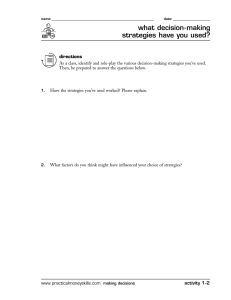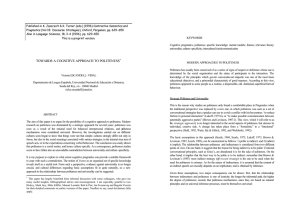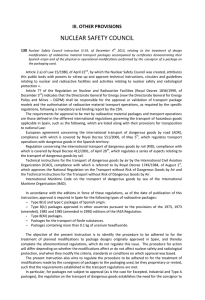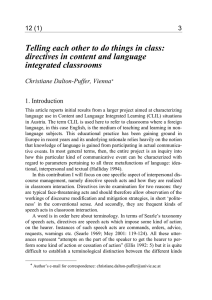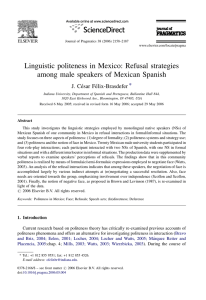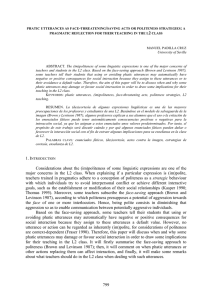The speech act of requesting has been one of the most widely
Anuncio
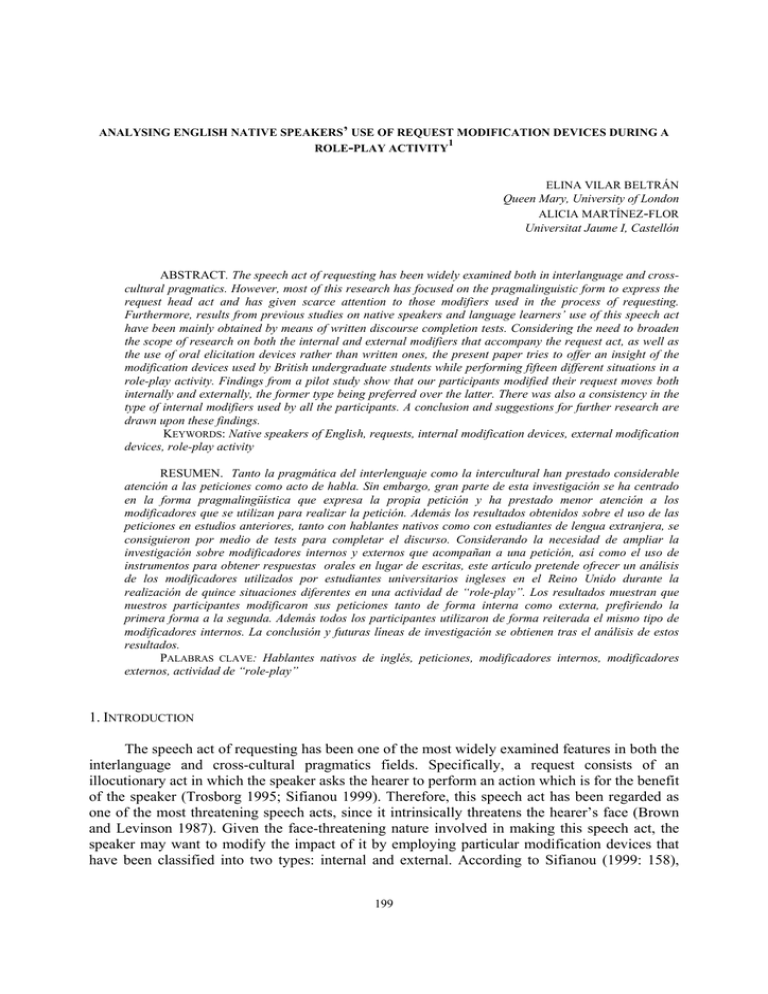
ANALYSING ENGLISH NATIVE SPEAKERS’ USE OF REQUEST MODIFICATION DEVICES DURING A 1 ROLE-PLAY ACTIVITY ELINA VILAR BELTRÁN Queen Mary, University of London ALICIA MARTÍNEZ-FLOR Universitat Jaume I, Castellón ABSTRACT. The speech act of requesting has been widely examined both in interlanguage and crosscultural pragmatics. However, most of this research has focused on the pragmalinguistic form to express the request head act and has given scarce attention to those modifiers used in the process of requesting. Furthermore, results from previous studies on native speakers and language learners’ use of this speech act have been mainly obtained by means of written discourse completion tests. Considering the need to broaden the scope of research on both the internal and external modifiers that accompany the request act, as well as the use of oral elicitation devices rather than written ones, the present paper tries to offer an insight of the modification devices used by British undergraduate students while performing fifteen different situations in a role-play activity. Findings from a pilot study show that our participants modified their request moves both internally and externally, the former type being preferred over the latter. There was also a consistency in the type of internal modifiers used by all the participants. A conclusion and suggestions for further research are drawn upon these findings. KEYWORDS: Native speakers of English, requests, internal modification devices, external modification devices, role-play activity RESUMEN. Tanto la pragmática del interlenguaje como la intercultural han prestado considerable atención a las peticiones como acto de habla. Sin embargo, gran parte de esta investigación se ha centrado en la forma pragmalingüística que expresa la propia petición y ha prestado menor atención a los modificadores que se utilizan para realizar la petición. Además los resultados obtenidos sobre el uso de las peticiones en estudios anteriores, tanto con hablantes nativos como con estudiantes de lengua extranjera, se consiguieron por medio de tests para completar el discurso. Considerando la necesidad de ampliar la investigación sobre modificadores internos y externos que acompañan a una petición, así como el uso de instrumentos para obtener respuestas orales en lugar de escritas, este artículo pretende ofrecer un análisis de los modificadores utilizados por estudiantes universitarios ingleses en el Reino Unido durante la realización de quince situaciones diferentes en una actividad de “role-play”. Los resultados muestran que nuestros participantes modificaron sus peticiones tanto de forma interna como externa, prefiriendo la primera forma a la segunda. Además todos los participantes utilizaron de forma reiterada el mismo tipo de modificadores internos. La conclusión y futuras líneas de investigación se obtienen tras el análisis de estos resultados. PALABRAS CLAVE: Hablantes nativos de inglés, peticiones, modificadores internos, modificadores externos, actividad de “role-play” 1. INTRODUCTION The speech act of requesting has been one of the most widely examined features in both the interlanguage and cross-cultural pragmatics fields. Specifically, a request consists of an illocutionary act in which the speaker asks the hearer to perform an action which is for the benefit of the speaker (Trosborg 1995; Sifianou 1999). Therefore, this speech act has been regarded as one of the most threatening speech acts, since it intrinsically threatens the hearer’s face (Brown and Levinson 1987). Given the face-threatening nature involved in making this speech act, the speaker may want to modify the impact of it by employing particular modification devices that have been classified into two types: internal and external. According to Sifianou (1999: 158), 199 internal modification devices refer to those linguistic elements that appear within the same request act in order to mitigate or intensify its force (e.g. Could you probably open the door for me?), whereas external modification devices appear in the immediate linguistic context surrounding the request act (e.g. Could you open the door for me? I’m carrying so many bags that I cannot do it). Research conducted on both native-speakers and learners’ use of this particular speech act has mostly focused on examining their use of those pragmalinguistic formulae employed to express the request act itself (e.g. Can you …?, Would you …?, I need …, You must …), without paying special attention to the modification devices that accompany it (Rose 1999; Cook and Liddicoat 2002). Additionally, the typical instrument that has been employed to collect participants’ use of requests involves the written discourse-completion test, which has been criticised for being too artificial, as it presents short written segments rather than real-life extracts (Rose 1994). Considering these two aspects, that is the need to focus on the modification devices employed when making a request and the elaboration of other instruments that elicit oral responses, the aim of this paper is to analyse English native-speakers’ use of both internal and external request modification devices when performing a spontaneous oral role-play activity. 2. METHODOLOGY Participants taking part in our pilot study consisted of twelve undergraduate students (n=12) from two UK universities, namely those of Queen Mary University of London and University of Cambridge. Participants were asked to take part in a series of role-play activities. Participants of this pilot study consisted of five female and seven male students from England, Scotland and Northern Ireland. All of them were native speakers of English and all, except one, knew at least another language to a certain extent. They were studying a wide range of degrees, such as Modern Languages, Veterinary Medicine or Social and Political Sciences. The research was carried out by the first researcher. One of the aims of the pilot study was to find out whether role-play situations participants had to act out during the study elicited request mitigation devices. Identifying what type of devices participants used was also recorded. Our purpose was to obtain those situations which could elicit the larger amount of request modifiers, in order to use them with second or foreign language learners in the classroom setting. The data were collected during an oral role-play activity they voluntarily performed. The participants arranged a time with the first researcher of this study for the task to be carried out. Periods of thirty minutes were assigned to the participants throughout a day and were asked to enter the researcher’s office in couples. They were told that their interaction was going to be recorded and that their participation consisted in listening to fifteen situations, both read and illustrated with photographs made by the researcher, and they had to act them out depending on the role assigned to each one of them. They had no time to prepare the role-plays in advance, since we were interested in their spontaneity when involved in such an oral activity. After performing the fifteen role-plays another couple followed the process previously described until the six couples had completed the task. These fifteen role-plays were specifically designed for this pilot study, since they elicited request use and varied according to the three politeness systems that Scollon and Scollon (1995) identified, namely those of a deference politeness system, a solidarity politeness system and a hierarchical politeness system. These three politeness systems include the general and persistent regularities in face relationships. Within the deference politeness system (-P, +D)2, there is a 200 shared social level among the participants but there is no closeness among them. With regards to the solidarity politeness system (-P, -D) the participants are both close and equal. Finally, the hierarchical politeness system (+P) is characterised by asymmetrical social relations among the participants. Thus, we elaborated our role-plays under three groups considering this politeness system classification (see Appendix A): Group 1 included those belonging to the deference politeness system, that is, the situations involved professional colleagues who do not know each other well or people who do not know each other but belong to the same social scale (Role-plays 5, 7, 9, 10, 11, 12 and 15); Group 2 referred to the solidarity politeness system, that is, interactions between friends, members of the same family, neighbours or workmates (Role-plays 3, 4, 6, 13 and 14); and Group 3 considered the hierarchical politeness system by including situations between teachers and students (Role-plays 1, 2 and 8). The rank of imposition that we gave to the different role-plays was either weak or strong depending on the issue being requested. Hence, we had role-plays with a weak degree of imposition (Role-plays 1, 5, 6, 7, 8, 11 and 15) in which the request was not considered as an excessive burden to the one who received the request; and those with a strong degree of imposition (Role-plays 2, 3, 4, 9, 10, 12, 13 and14) in which the request was considered of great implication for the one being requested. All role-plays were tape-recorded and transcribed in order to analyse the amount and type of internal and external modifiers employed by the students when making the requests elicited in the different situations. For this analysis, we took into account the typology of peripheral modification devices in requests developed by Alcón, Safont and Martínez-Flor (2005), since it has been elaborated on previous research from the fields of interlanguage and cross-cultural pragmatics. 3. RESULTS AND DISCUSSION As mentioned above, the main purpose of this pilot study was to analyse the participants’ use of both internal and external modification devices when involved in the oral role-play activity. Table 1 shows the amount of time devoted by each couple to complete the performance of the fifteen situations, the request moves obtained and the total amount of internal and external modification devices used. Participants Couple 1 Couple 2 Couple 3 Couple 4 Couple 5 Couple 6 Time 13’01’’ 9’41’’ 12’20’’ 14’28’’ 22’33’’ 11’15’’ Internal modification Devices 41 66 32 21 38 32 Request moves 18 16 15 14 16 16 External modification devices 19 17 12 9 22 4 1h 23min 95 230 83 TOTAL Table 1. Participants’ amount of request moves, external and internal request modification devices As can be observed in Table 1, participants employed a higher number of internal modification devices compared to their use of external modifiers. There was a total of ninety-five request moves and all of them were modified either internally, externally or both. As we have 201 already mentioned, the participants had to act fifteen situations out and as can be inferred from Table 1, some couples used more requests in order to perform these situations than others, although all of them resorted more to the use of internal than external modification devices. These findings support the study by Faerch and Kasper (1989), which involved native speakers of English and German together with Danish learners of those languages, in that internal modification was also higher than external. However, the data collection technique used in Faerch and Kasper’s (1989) study was a written Discourse Completion Test (DCT), whereas the instrument employed in the present study was an oral role-play activity. Focusing specifically on our participants’ use of internal and external modification devices, Figure 1 below illustrates the total amount of each group of modifiers, whereas Table 2 shows the distribution of each type of modifier depending on whether it belongs to the internal or external group of devices. Internal modification devices 27% 73% External modification devices Figure 1. Total amount of internal and external modification devices TYPES OF INTERNAL MODIFICATION DEVICES n Openers 15 Softeners Understatement 1 Downtoner 10 Hedge 0 Intensifiers 28 Fillers Hesitators 116 Cajolers 2 Appealers 4 Attention-getters 54 TOTAL 230 TYPES OF EXTERNAL MODIFICATION DEVICES Preparators 2 Grounders 21 Disarmers 21 Expanders 5 Promise of reward 4 Please 30 TOTAL 83 Table 2. Participants’ use of the different types of external and internal request modification devices 202 As it is illustrated in Table 2 above, all types of modification devices (i.e. openers, softeners, intensifiers, fillers, preparators, grounders, disarmers, expanders, promise of rewards and please) occurred in our data, except for “hedges”. Results indicate that the higher amount of modifiers used were “hesitators” (n=116), in line with previous studies that also used role-plays as the data collection procedure (Kasper 1981; Trosborg 1995). Additionally, they used “hesitators” in all situations that involved a request addressed to a person of a high rank of imposition, probably due to the fact that they needed more time to think how to mitigate the request. The next modifier with a higher number of occurrences was “attention-getters” (n=54), which also fall into the fillers category within the type of internal modification devices. The fact that the fillers, that is, those “optional lexical items used by speakers to fill in the gaps that occur during an interaction” (Sifianou 1999: 179), is the category that includes a higher number of occurrences, might be related to the role-play activity used as the data elicitation technique for this study, since participants performed the situations spontaneously with no time in advance to prepare the interactions. Occurrences of openers (n=15) and softeners (n=11) were also found in our data, although to a lesser extent (e.g. do you reckon you could maybe recommend …). Finally, obtaining a high degree of intensifiers (n=28) (e.g. really) might have been due to the fact that, in some situations, they are used to emphasise the extent to which the item being requested is needed or wanted. Regarding participants’ use of external modifiers (see Table 2 above), it can be seen that “grounders” (e.g. that’s quite a large amount of money, do you have your passport…?) and “disarmers” (e.g. I am really sorry to bother you but I was wondering if you could…) were the most frequently modifiers employed, amounting to a total of 21 instances found for each type. By means of using a grounder, the participants let the addressee know the purpose of the request and might reduce the threat to the hearer’s face (Faerch and Kasper 1989), whereas students’ use of a disarmer “provides reasons to ‘disarm’ the addressee from the possibility of a refusal” (MárquezReiter 2000: 93). Therefore, it might be worth pointing out that the use of these two external modifiers softened the request head act employed by students to a great extent. Other modifiers, such as “preparators” (n=2), “expanders” (n=5) and “promise of reward” (n=4) were also employed, but only in limited occasions. Finally, the use of please (n=30) was very high among our participants, probably because it is an explicit and transparent marker of politeness commonly used among English speakers. 4. CONCLUSION Our pilot study aimed at examining the different modification devices used by English undergraduate students while performing a role-play activity. Results obtained by means of analysing participants’ request moves in the fifteen situations completed by the six couples indicated that (1) our participants modified all the requests produced in the role-play activity; and (2) a higher use of internal modifiers, or “fillers” more specifically, was employed when compared to external modifiers. One important issue to examine in future research therefore, is the need for a more thorough analysis of the fifteen role-play situations with regards to the specific modification devices elicited and their relation to both, the three politeness systems that Scollon and Scollon (1995) identified and the rank of imposition assigned to each situation. Moreover, it would be very interesting to analyse how the same role-play situations can be used in the second or foreign language classroom setting in order to elicit learners’ use of requests. In the meantime, the present study has contributed to widen the fields of interlanguage and cross203 cultural pragmatics by analysing how requests can be modified by means of both internal and external devices in a variety of communicative situations. NOTES 1. This study is part of a research project funded by (a) the Spanish Ministerio de Educación y Ciencia (HUM200404435/FILO), co-funded by FEDER, and (b) Fundació Universitat Jaume I and Caixa Castelló-Bancaixa (P1.1B2004-34). 2. P stands for Power and D for Distance. The symbol + means that there is a difference in Power or Distance amongst the participants, whereas the symbol – means that there is a close relationship of Power and Distance. REFERENCES Alcón, E., P. Safont and A. Martínez-Flor. 2005. “Towards a typology of modifiers for the speech act of requesting: A socio-pragmatic approach”. RæL: Revista Electrónica de Lingüística Aplicada 4: 1-35. Brown, P. and S. Levinson 1987. Politeness: Some universals in language use. Cambridge: Cambridge University Press. Cook, M. and A. J. Liddicoat 2002. “The development of comprehension in interlanguage pragmatics: The case of request strategies in English”. Australian Review of Applied Linguistics 25/1: 19-39. Faerch, C. and G. Kasper. 1989. “Internal and external modification in interlanguage request realization”. Cross-cultural pragmatics: Requests and apologies. Eds. S. Blum-Kulka, J. House and G. Kasper. Norwood, NJ: Ablex. 221-247. Kasper, G. 1981. Pragmatische Aspekte in der Interrimsprache [Pragmatic aspects in interlanguage]. Tübingen: Narr Verlag. Márquez Reiter, R. 2000. Linguistic politeness in Britain and Uruguay. A contrastive study of requests and apologies. Amsterdam: John Benjamins. Rose, K. R. 1994. “On the Validity of DCTs in Non-Western Contexts.” Applied Linguistics 15: 1-14. Rose, K. R. 1999. “Teachers and students learning about requests in Hong Kong”. Culture in second language teaching and learning. Ed. E. Hinkel. Cambridge: Cambridge University Press. 167-180. Scollon, R. and S. W. Scollon. 1995. Intercultural Communication: A Discourse Approach. Oxford: Blackwell. Sifianou, M. 1999. Politeness phenomena in England and Greece. A cross-cultural perspective. Oxford: Oxford University Press. Trosborg, A. 1995. Interlanguage pragmatics. Requests, Complaints and Apologies. Berlin: Mouton de Gruyter. 204 APPENDIX A GROUP 1: Role-plays related to the deference politeness system. 5. You work at a library and see someone using her mobile. Mobiles are not allowed in the library. You ask her. 7. It’s your first day as a cleaner at a big institution and you don’t know where to go. You ask a security guard. 9. You work at a bank. A lady just walked in asking for a big amount of money. You need to see some sort of identification. You ask her. 10. You work as a hairdresser and you are dying the hair of a woman. She has been trying to tell you something about her hair for a while but you don’t understand her. You tell her. 11. You bought a pumpkin a day ago and it was very dry. You want your money back. You go to the store and ask them. 12. You are very hungry and walk into a bar. You just want a doughnut but you have no money. You ask the bar tender. 15. You are organising a party. You would like to buy a range of different cheeses but you want to try them first. You ask the butcher. GROUP 2: Role-plays related to the solidarity politeness system. 3. You are at your university and have a problem with your laptop. You take it to one of the IT people. He has a lot of work and needs some time to take a look at it. He tells you. 4. One of the secretaries of the English Department has to leave work an hour early. However she still has many things to do. She has no time and needs help to finish her work. She asks her workmate. 6. A friend of yours borrowed your notes a long time ago. You need them for the exams. You ask her. 13. Your best friend drove his dad’s car to the university today. You really want to try it. You ask him. 14. You are refurbishing your kitchen at home. It’s quite late at night but you remember that not long ago your neighbour refurbished hers. You want to see how it looks like. You ask her. GROUP 3: Role-plays related to the hierarchical politeness system. 1. You walk in a lecture half an hour late and interrupt the teacher. Everyone stares at you. You want to know if you can stay. You ask the teacher. 2. You don’t understand something from your book. However, you know your teacher had already explained that in his last lesson. You go to his office anyway and ask him. 8. You work as a doctor and cannot find one of your patients’ blood tests results. You phone the nurse and ask her. 205
